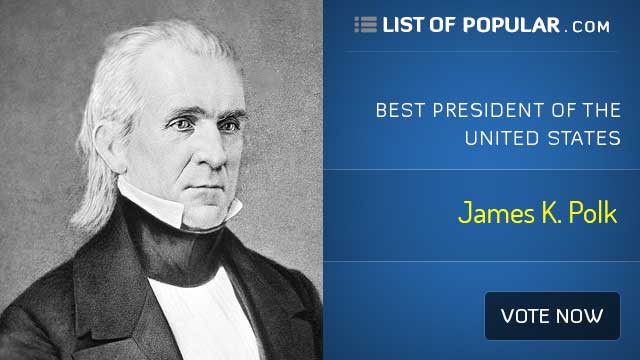The Best US President - James K. Polk
Early Life and Political Beginnings
James Knox Polk, the eleventh President of the United States, was born on November 2, 1795, in Pineville, North Carolina. Raised in a family with a strong interest in politics, Polk attended the University of North Carolina before studying law. His political career began in the Tennessee state legislature, where he quickly rose through the ranks, serving as Speaker of the House and later as governor of Tennessee.
Manifest Destiny and the Oregon Trail
Polk's presidency (1845–1849) is closely associated with the concept of Manifest Destiny, the belief that the United States was destined to expand across the North American continent. One of his administration's priorities was the resolution of the Oregon boundary dispute with Britain. Polk's campaign slogan in 1844 included the call for "Fifty-Four Forty or Fight," referring to the latitude he sought as the northern boundary of the Oregon Territory. Ultimately, a compromise was reached with Britain, establishing the 49th parallel as the boundary.
Mexican-American War and Territorial Expansion
One of the most consequential events of Polk's presidency was the Mexican-American War (1846–1848). The dispute over the southern border of Texas and the desire to acquire California led to conflict with Mexico. The war resulted in significant territorial gains for the United States through the Treaty of Guadalupe Hidalgo, adding present-day California, Arizona, New Mexico, Nevada, Utah, and parts of Colorado, Wyoming, Kansas, and Oklahoma to the nation.
Acquisition of California and the Gold Rush
The acquisition of California under Polk's administration played a pivotal role in the westward expansion of the United States. The discovery of gold in California in 1848, just days before Polk left office, further accelerated the region's growth and led to the California Gold Rush. The influx of people seeking fortune had profound economic and social impacts on the nation.
Domestic Policies and Walker Tariff
Polk's domestic policies were also marked by the implementation of the Walker Tariff in 1846. Named after Secretary of the Treasury Robert J. Walker, the tariff aimed to reduce rates and stimulate trade. While the tariff was intended to be a revenue measure, it had broader economic implications, contributing to the growing sectional tensions between the North and the South over issues such as tariffs and slavery.
Decision Not to Seek Re-Election and Later Years
Polk, adhering to his pledge to serve only one term, chose not to seek re-election in 1848. Exhausted from the demands of the presidency and facing health issues, he retired to his estate, Polk Place, in Nashville, Tennessee. Tragically, he succumbed to cholera on June 15, 1849, just three months after leaving office, making him the shortest-lived ex-president in U.S. history.
Legacy and Historical Assessment
James K. Polk's presidency is often regarded as one of the most successful in achieving its stated goals. His commitment to Manifest Destiny significantly expanded the territorial reach of the United States, but it also fueled controversies over the expansion of slavery into newly acquired territories. Polk's strategic leadership during a critical period in American history left an indelible mark on the nation's geography and set the stage for the sectional conflicts that would ultimately lead to the Civil War.
Conclusion
James K. Polk's presidency, though short-lived, was characterized by bold initiatives and a clear vision of territorial expansion. His actions during the Mexican-American War and the acquisition of vast territories in the West shaped the nation's trajectory and left a lasting impact on the map of the United States, defining the contours of the continental nation we know today.
James K. Polk's legacy reflects the complexities of 19th-century American expansionism and the challenges associated with balancing territorial growth, economic interests, and the divisive issue of slavery.

